Key Takeaways
- Bariatric surgery for children is a growing option for those with severe obesity, offering significant health improvements, but it involves long-term lifestyle changes and medical care.
- Candidates must meet strict criteria, including a high BMI, serious health conditions, and unsuccessful attempts at weight loss through traditional methods. Family support and mental readiness are essential.
- While the surgery can dramatically improve physical and mental health, it carries surgical risks, lifelong nutritional challenges, and the need for ongoing medical monitoring.
If your child struggles with severe obesity, you might be wondering about weight loss surgery as an option. Bariatric surgery for children is becoming more common, but it brings up many questions for parents. Is it safe? Is there an age limit for bariatric surgery? Is it right for a young person? How young is too young?
As childhood obesity rates keep rising, more families face these tough questions. This article will help you understand weight loss surgery for kids—who can get it, how it might help, what risks it brings, and the important ethical issues to think about.
Table of Contents
Understanding Pediatric Obesity
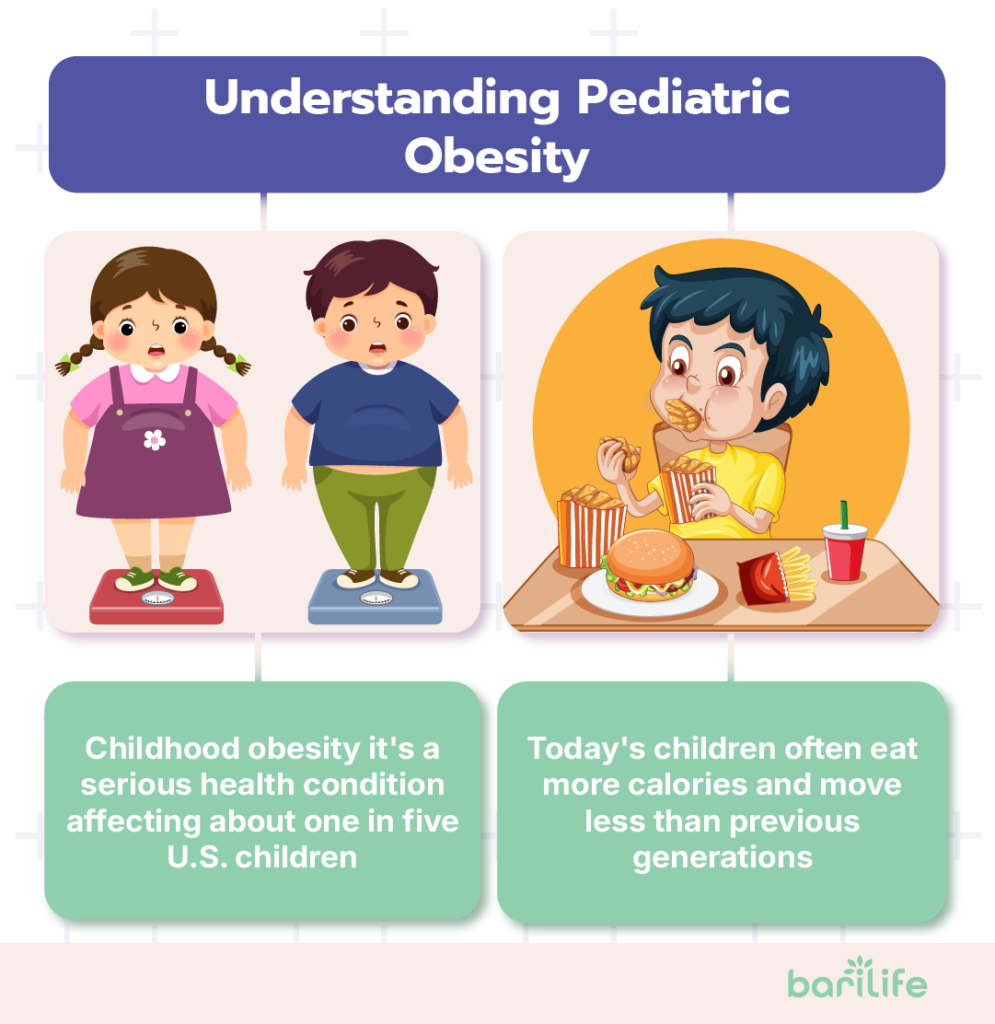
Before thinking about surgery, it’s important to understand how serious childhood obesity is. This isn’t just about a few extra pounds—it’s a serious health condition affecting about one in five U.S. children. Recent studies show that nearly 20% of children and teens aged 2-19 were obese between 2017 and 2020, and these numbers keep going up.
The health effects can be severe. Many obese children develop conditions once only seen in adults:
- Elevated blood pressure
- High cholesterol
- Type 2 diabetes
- Fatty liver
- Sleep apnea.
These conditions can harm growing bodies and lead to serious health problems that follow them into adulthood.
Several factors cause childhood obesity. Genetics plays a part, but diet, lack of physical activity, poor sleep patterns, and family habits also have big effects.
Today’s children often eat more calories and move less than previous generations.
Types of Bariatric Surgery for Children
Doctors consider several types of weight loss operations for children:
- Sleeve gastrectomy: This is now the most common procedure for young patients. The bariatric surgeon gets rid of about 80% of the stomach. This smaller stomach helps children feel full quickly and reduces hunger hormones. Most children’s weight loss surgery programs prefer this option because it works well without changing the intestines.
- Gastric bypass: This bariatric procedure involves creating a small stomach pouch that connects directly to the center part of the small intestine. This limits food intake and reduces calorie absorption. While effective, doctors use it less often in children because it can cause more nutritional problems during important growth years.
Eligibility Criteria for Pediatric Bariatric Surgery
Not every overweight child should have bariatric surgery. Doctors have strict requirements.
Most programs require a body mass index (BMI) of at least 40 or 35+ with serious health problems like diabetes or sleep apnea.
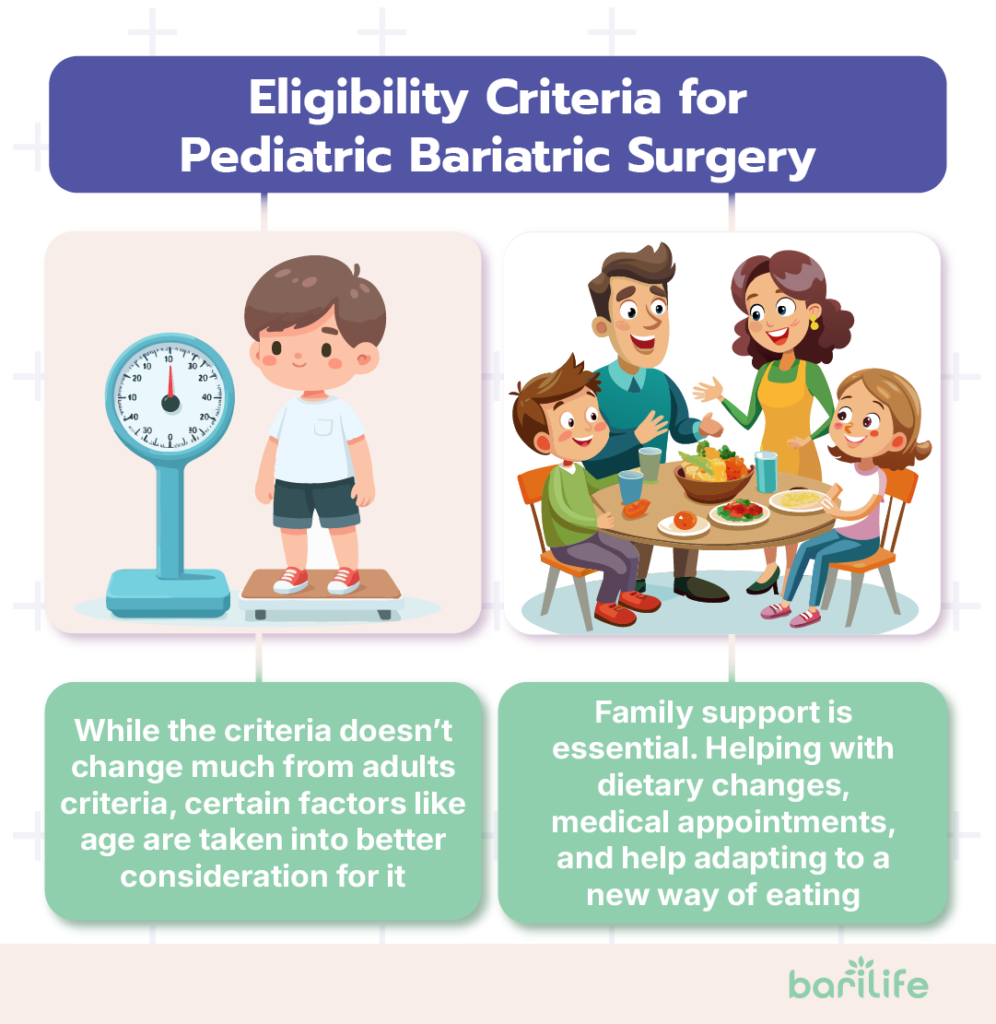
Age matters, too The best age for bariatric surgery varies, but there’s no absolute minimum age, doctors rarely operate on very young children.
A 12-year-old would only be considered if they had dangerous obesity-related health problems that didn’t improve with other treatments. Some teens undergo bariatric surgery at 16, especially if their physical and mental development is advanced.
Physical development is important. Most surgeons want children to be nearly done growing before surgery to avoid disrupting normal development. Mental readiness is just as important—children need to understand the procedure and commit to lifelong changes.
Previous weight loss attempts are typically required, usually at least 6 months of supervised weight management programs without success.
Family support is essential. Parents must be ready to help with dietary changes, medical appointments, and helping their children adapt to a new way of eating.
Benefits of Bariatric Surgery for Kids
When the right children have bariatric surgery, the benefits can change their lives. Studies show that most people lose up to 60% of their excess weight after bariatric surgery.
This weight loss can lead to impressive health improvements in conditions such as type 2 diabetes, blood pressure, cholesterol, and sleep apnea.
The emotional and social benefits can be just as important. Many children experience less bullying, better self-esteem, and reduced depression after surgery.
They can often join activities they avoided before due to physical limitations or embarrassment, which helps their social development.
Risks and Potential Complications
Despite the benefits, bariatric surgery for children comes with serious risks. Surgical complications like bleeding, infection, and leaks can happen and, though uncommon, may be serious.
Growing children face significant nutritional concerns after surgery. They’ll need to take vitamins and supplements every day for life to prevent deficiencies that could affect their development. Their growth might also be affected if surgery happens before they’re fully developed.
Many children face psychological challenges as their bodies change quickly. Some develop body image issues or replace food-focused behaviors with other problems, making ongoing mental health support important.
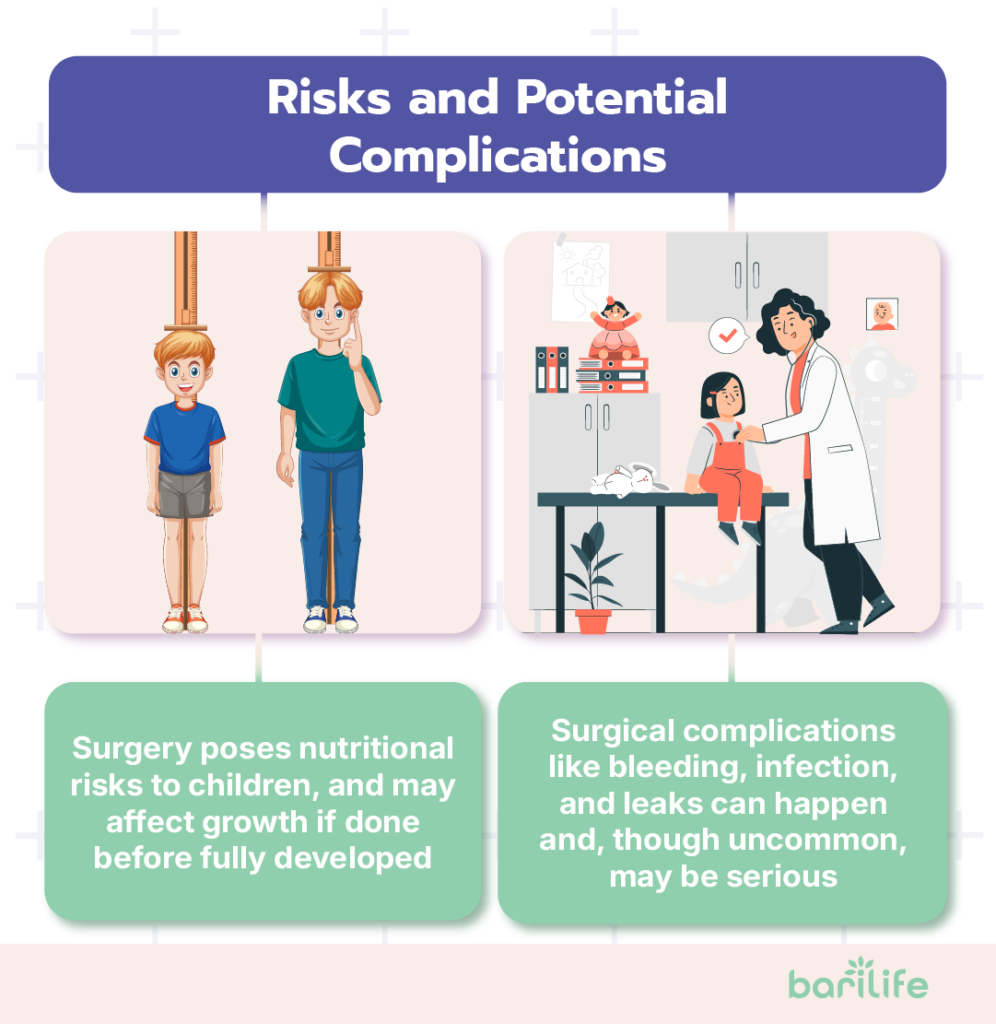
Weight regain is common, with studies showing that 20-25% of lost weight typically returns within ten years. Perhaps most concerning is what we don’t know about very long-term effects, since pediatric bariatric surgery is still relatively new.
Ethical and Controversial Aspects
Bariatric surgery for children raises difficult ethical questions. Can children really understand the lifelong effects of such a major procedure? Even teenagers may not fully grasp how this surgery will affect them decades later.
Timing creates another difficult choice. Early surgery might prevent years of health problems and bullying, but waiting allows children more input in such a permanent decision. Access to care is another issue, as minority and lower-income children often have higher obesity rates but less access to specialized treatment.
Public perception remains a challenge, with many people viewing children’s weight loss surgery as “taking the easy way out” rather than treating a serious medical condition. This stigma affects both treatment decisions and emotional adjustment.
Medical experts continue debating whether resources should focus more on prevention rather than surgery, though non-surgical approaches often fail for children with established severe obesity.
Life After Bariatric Surgery
If your child has bariatric surgery, understanding what comes next is crucial for long-term success. The changes will affect your entire family, not just your child.
Eating habits will change significantly and permanently. Your child will need to eat small portions, focus on protein-rich foods, and avoid foods that might cause discomfort or nutritional problems. As parents, you’ll need to support these changes throughout your home, which often means changing family meals and snacks for everyone.
Daily vitamins and minerals become an essential part of life. Your child will need to get blood tests regularly to check their nutritional status and prevent deficiencies that could affect their growth and development. This medical monitoring is a lifelong commitment.
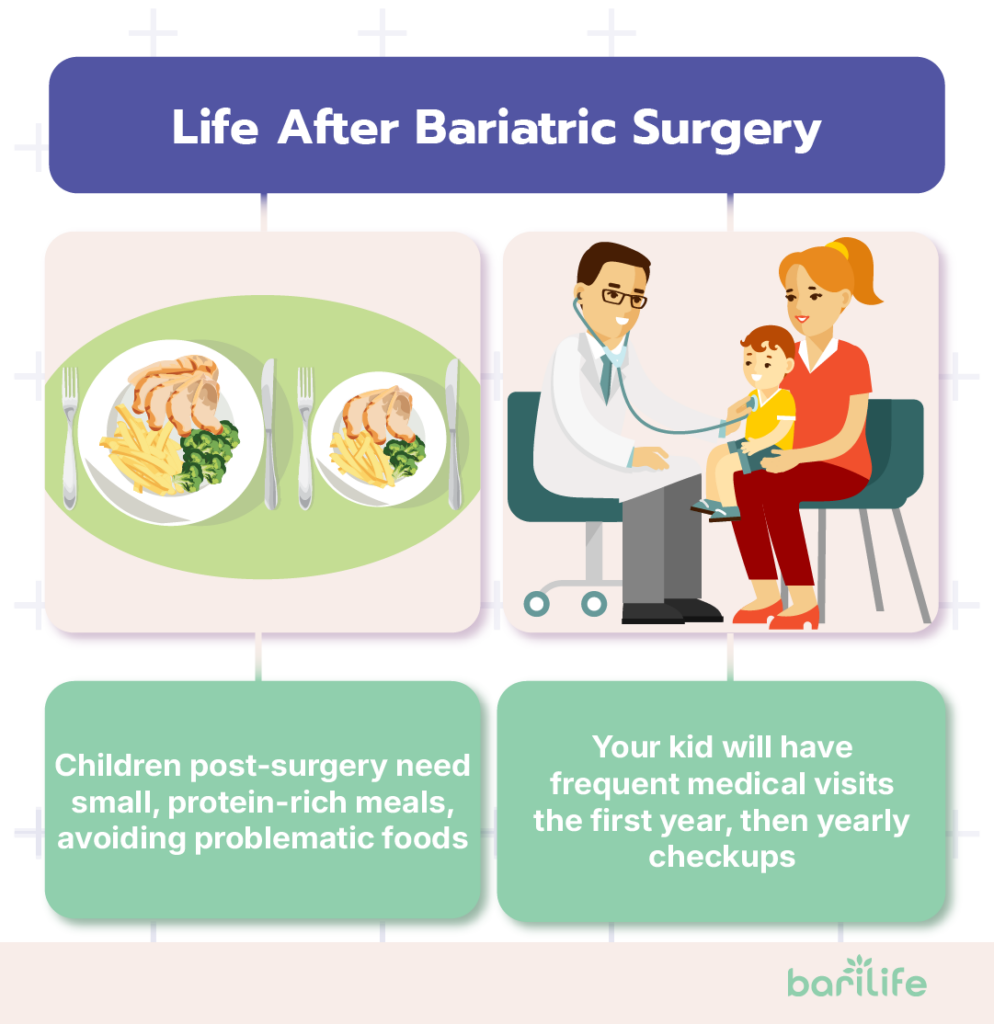
Physical activity becomes even more important after surgery. Regular exercise helps maintain weight loss, builds muscle, and improves overall health. Finding activities your child actually enjoys will help make exercise a regular part of their routine rather than a chore.
The emotional journey continues long after surgery. Many programs offer support groups specifically for young bariatric patients where kids can connect with others going through similar experiences. This psychological support helps them handle the sometimes overwhelming feelings that come with rapid weight loss and body changes.
Medical follow-up becomes a regular part of life, starting with frequent appointments every few months during the first year, then typically once yearly after that. During these holidays, doctors monitor weight loss progress, check nutritional status, and watch for any potential complications.
As your child grows up, they’ll gradually take more responsibility for managing their post-surgical health. This change from pediatric to adult medical care is an important step that requires preparation and support.
Conclusion
Bariatric surgery can be life-changing for carefully selected children with severe obesity. However, this is never a decision to be taken lightly.
If you’re considering this option for your child, look for a specialized center with experience in pediatric weight management and bariatric surgery. A team of pediatric specialists can help determine if surgery is appropriate for your child’s specific situation.
How Bari Life Can Help
At Bari Life, we understand the unique nutritional needs of bariatric patients — including children and teens who undergo weight loss surgery. Our comprehensive line of bariatric vitamins, bariatric multivitamins, and bariatric protein shakes are specially formulated to prevent nutrient deficiencies and support long-term health.
Post-surgery, maintaining proper nutrition is essential for growth, development, and overall well-being. Bari Life’s easy-to-take options include bariatric vitamins chewable, liquid bariatric vitamin, and bariatric multivitamin with iron, ensuring your child gets the necessary vitamins and minerals every day. For added support, we offer bariatric calcium chews and bariatric vitamins for hair loss to target common deficiencies and concerns.
We also know that staying on track can be easier with delicious and convenient choices. That’s why we provide a variety of bariatric snacks, such as bariatric protein bars, and essential digestive support with our high-quality bariatric probiotic supplements.
Plus, our expert resources and support can help your family navigate the challenges of life after bariatric surgery with confidence.
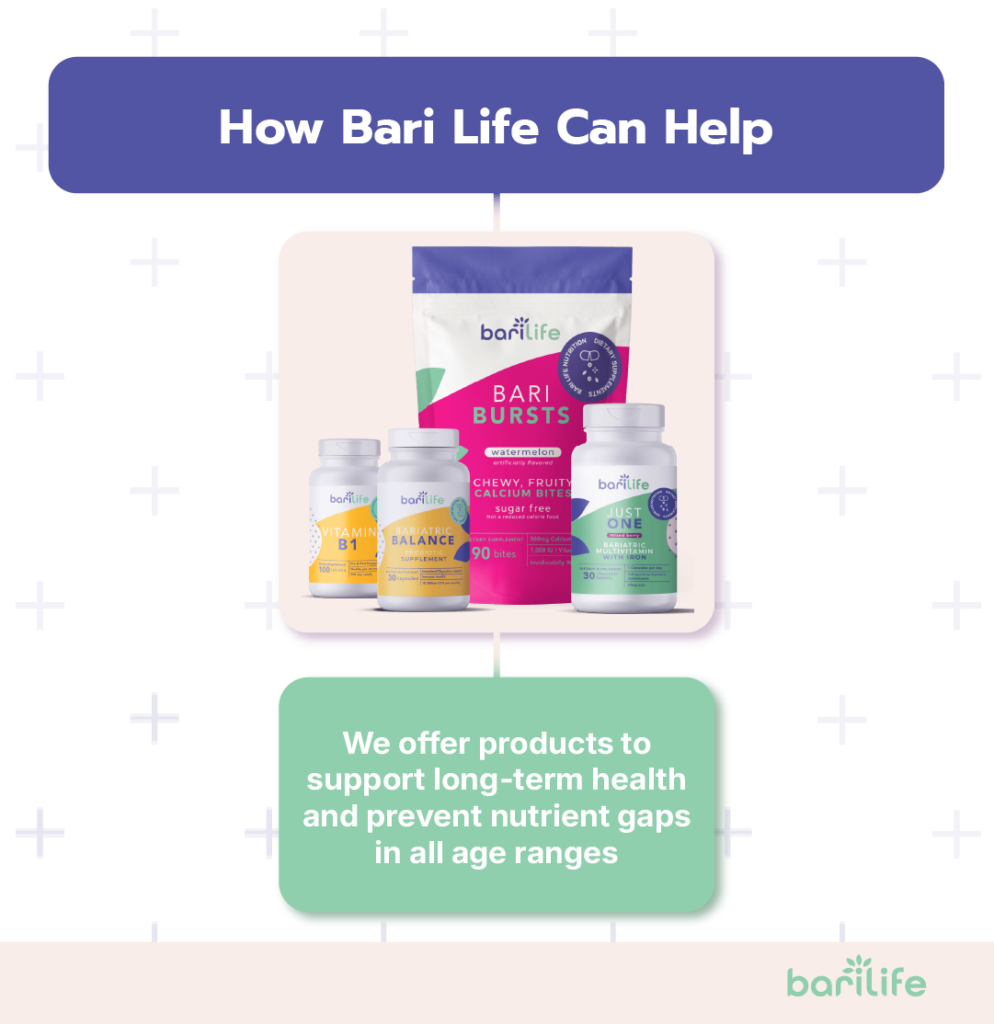
Ready to support your child’s health journey? Visit Bari Life to explore our tailored nutrition solutions — including bariatric multivitamins, bariatric protein shakes, and more — and discover how we can help your family every step of the way.
If you want to learn more, why not check out these articles below:
Resources
Adolescent Bariatric Surgery (Pediatric Weight Loss Surgery). (2023). Cleveland Clinic.
Bariatric Surgery in Adolescents. (2016). Mayo Clinic.
Calcaterra, V., et al.. (2021). Bariatric Surgery in Adolescents: To Do or Not to Do? Children.
Childhood Obesity Facts. (2024). CDC.
Is weight loss surgery right for my child? (2022). Healthychildren.org.



What are your tips and tricks to post-bariatric success?